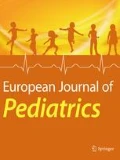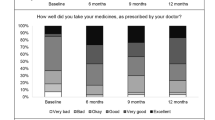Abstract
Our objective was to assess the value of transition preparation consultations (TPC) offered by the AD’venir unit (R. Debré hospital, Paris) as a new service of transitional care, from the perspective of adolescents with chronic conditions (CCs) and their referring healthcare providers (RHCPs). TPCs included a face-to-face interview with pediatricians trained in adolescent medicine, exploring the adolescent’s past (CC history), present (daily life, Treatment Burden Questionnaire, family/peer relationships, school, hobbies, sexuality, drugs), and future (global life project, transition, Good2Go questionnaire). The mixed-methods design included the following: a qualitative analysis within a multidisciplinary group (clinicians/sociologists/psychologist/public health researchers) of audio-recordings of TPCs (n = 27/girls = 56%/median age = 17.7 years) and phone interviews with adolescents 2 years post-TPC (n = 26); and a quantitative analysis of the Treatment Burden and Good2Go questionnaires and the benefits perceived by RHCPs (questionnaire 6 months post-TPC). TPCs were a form of training for adult care, adolescents meeting a practitioner alone often for the first time. Naming their CC was difficult. All complained of limitations experienced in social life (diet, fatigue, laboratory/medical appointments), but not the treatment itself; most adolescents willingly talked about sexuality. Adolescents’ feelings about transition were various, with poor representations of adult healthcare. Transfer was frequently unplanned. After TPCs, RHCPs modified their practices. Transition in the 2 years post-TPC was usually successful.
Conclusion
What is Known: • In adolescents with chronic conditions, it is advocated to personalize transition care according to the clinical and social context, pointed out as potentially impacting. • Little is known about the most effective ways to prepare patients according to their needs. | |
What is New: • Based on a global approach to adolescent health, transition preparation consultations are delivered by specially trained physicians. • They are a feasible and valuable way to highlight facilitators and barriers to successful transition and initiate the adolescents’ own vision of their future. |



Similar content being viewed by others
Availability of data and material
The authors are willing to share all data and material for future research, on request.
Abbreviations
- CC:
-
Chronic condition
- HCP:
-
Healthcare professional
- IBD:
-
Inflammatory bowel disease
- TPC:
-
Transition preparation consultation
- RHCP:
-
Referring healthcare professional
- TBQ:
-
Treatment Burden Questionnaire
- TP:
-
Transition pediatrician
References
Blum RW, Garell D, Hodgman CH et al (1993) Transition from child-centered to adult health-care systems for adolescents with chronic conditions. A position paper of the Society for Adolescent Medicine. J Adolesc Health 14:570–576
Sawyer SM, Azzopardi PS, Wickremarathne D, Patton GC (2018) The age of adolescence. Lancet Child Adolesc Health 2:223–228
Michaud P-A, Suris J-C, Viner R (2007) The adolescent with a chronic condition : epidemiology, developmental issues and health care provision. World Health Org
Cooley WC, Sagerman PJ (2011) Supporting the health care transition from adolescence to adulthood in the medical home. Pediatrics 128:182–200
Mazur A, Dembinski L, Schrier L et al (2017) European Academy of Paediatric consensus statement on successful transition from paediatric to adult care for adolescents with chronic conditions. Acta Paediatr 106:1354–1357
Singh SP, Anderson B, Liabo K et al (2016) Supporting young people in their transition to adults’ services: summary of NICE guidance. BMJ 353:i2225
Crowley R, Wolfe I, Lock K, McKee M (2011) Improving the transition between paediatric and adult healthcare: a systematic review. Arch Dis Child 96:548–553
Morsa M, Gagnayre R, Deccache C, Lombrail P (2017) Factors influencing the transition from pediatric to adult care: a scoping review of the literature to conceptualize a relevant education program. Patient Educ Couns 100:1796–1806
Sattoe JNT, Peeters MAC, Haitsma J et al (2020) Value of an outpatient transition clinic for young people with inflammatory bowel disease: a mixed-methods evaluation. BMJ Open 10:e033535. https://doi.org/10.1136/bmjopen-2019-033535
Hart LC, Patel-Nguyen SV, Merkley MG, Jonas DE (2019) An evidence map for interventions addressing transition from pediatric to adult care: a systematic review of systematic reviews. J Pediatr Nurs 48:18–34
Farre A, Wood V, McDonagh JE et al (2016) Health professionals’ and managers’ definitions of developmentally appropriate healthcare for young people: conceptual dimensions and embedded controversies. Arch Dis Child 101:628–633
Parfeniuk S, Petrovic K, MacIsaac P et al (2020) Transition readiness measures for adolescents and young adults with chronic health conditions: a systematic review. J Transit Med 2:1
Scal P, Evans T, Blozis S et al (1999) Trends in transition from pediatric to adult health care services for young adults with chronic conditions. J Adolesc Health Off Publ Soc Adolesc Med 24:259–264
Le Roux E, Mellerio H, Jacquin P et al (2019) Practical generic guidelines for paediatric-to-adult transition for adolescents with chronic disease. Eur J Public Health 29:442–448
Goldenring J, Rosen D (2004) Getting into adolescent heads: an essential update. Contemp Pediatr 21(1):64–92
Tran V-T, Montori VM, Eton DT et al (2012) Development and description of measurement properties of an instrument to assess treatment burden among patients with multiple chronic conditions. BMC Med 10:68
Mellerio H, Jacquin P, Trelles N et al (2020) Validation of the “Good2Go”: the first French-language transition readiness questionnaire. Eur J Pediatr 179:61–71
Skivington K, Matthews L, Simpson SA et al (2021) A new framework for developing and evaluating complex interventions: update of Medical Research Council guidance. BMJ 374:n2061
Hennink MM, Kaiser BN, Marconi VC (2017) Code saturation versus meaning saturation: how many interviews are enough?. Qual Health Res 27:591–608
Paillé P, Mucchielli A (2016) L’analyse qualitative en sciences humaines et sociales-4e éd. Armand Colin
Tong A, Sainsbury P, Craig J (2007) Consolidated criteria for reporting qualitative research (COREQ): a 32-item checklist for interviews and focus groups. Int J Qual Health Care J Int Soc Qual Health Care 19:349–357
Schwartz L, Tuchman LK, Hobbie WL, Ginsberg JP (2011) A social-ecological model of readiness for transition to adult-oriented care for adolescents and young adults with chronic health conditions. Child Care Health Dev 37:883–895
Wagner EH (1998) Chronic disease management: what will it take to improve care for chronic illness?. Eff Clin Pr 1(1)
Van Bulck L, Luyckx K, Goossens E et al (2019) Illness identity: capturing the influence of illness on the person’s sense of self. Eur J Cardiovasc Nurs J Work Group Cardiovasc Nurs Eur Soc Cardiol 18:4–6
Nap-van der Vlist MM, Dalmeijer GW, Grootenhuis MA et al (2019) Fatigue in childhood chronic disease. Arch Dis Child 104:1090–1095
Mellerio H, Guilmin-Crépon S, Jacquin P et al (2015) Long-term impact of childhood-onset type 1 diabetes on social life, quality of life and sexuality. Diabetes Metab 41:489–497
Colver A, Rapley T, Parr JR et al (2020) Facilitating transition of young people with long-term health conditions from children’s to adults’ healthcare services - implications of a 5-year research program. Clin Med Lond Engl 20:74–80. https://doi.org/10.7861/clinmed.2019-0077
Margolis R, Wiener L, Pao M et al (2017) Transition from pediatric to adult care by young adults with chronic granulomatous disease: the patient’s viewpoint. J Adolesc Health Off Publ Soc Adolesc Med 61:716–721
McInnes RA (2003) Chronic illness and sexuality. Med J Aust 179:263–266
Sawyer SM, Drew S, Yeo MS, Britto MT (2007) Adolescents with a chronic condition: challenges living, challenges treating. The Lancet 369:1481–1489
Suris J-C, Michaud P-A, Akre C, Sawyer SM (2008) Health risk behaviors in adolescents with chronic conditions. Pediatrics 122(e1113–1118):9
Mora MA, Sparud-Lundin C, Bratt EL, Moons P (2017) Person-centred transition programme to empower adolescents with congenital heart disease in the transition to adulthood: a study protocol for a hybrid randomised controlled trial (STEPSTONES project). BMJ Open 7:e014593
van Staa A, Sattoe JNT, Strating MMH (2015) Experiences with and outcomes of two interventions to maximize engagement of chronically ill adolescents during hospital consultations: a mixed methods study. J Pediatr Nurs 30(757–775):8
Nagra A, McGinnity PM, Davis N, Salmon AP (2015) Implementing transition: ready steady go. Arch Dis Child Educ Pract Ed 100:313–320
Moons P, Bratt E-L, De Backer J et al (2021) Transition to adulthood and transfer to adult care of adolescents with congenital heart disease: a global consensus statement of the ESC Association of Cardiovascular Nursing and Allied Professions (ACNAP), the ESC Working Group on Adult Congenital Heart Disease (WG ACHD), the Association for European Paediatric and Congenital Cardiology (AEPC), the Pan-African Society of Cardiology (PASCAR), the Asia-Pacific Pediatric Cardiac Society (APPCS), the Inter-American Society of Cardiology (IASC), the Cardiac Society of Australia and New Zealand (CSANZ), the International Society for Adult Congenital Heart Disease (ISACHD), the World Heart Federation (WHF), the European Congenital Heart Disease Organisation (ECHDO), and the Global Alliance for Rheumatic and Congenital Hearts (Global ARCH). Eur Heart J Nov 1;42(41):4213–4223
Kelly MA, Freeman LK, Dornan T (2019) Family physicians’ experiences of physical examination. Ann Fam Med
Fegran L, Hall EOC, Uhrenfeldt L et al (2014) Adolescents’ and young adults’ transition experiences when transferring from paediatric to adult care: a qualitative metasynthesis. Int J Nurs Stud 51:123–135
White PH, Cooley WC, Transitions Clinical Report Authoring Group et al (2018) Supporting the health care transition from adolescence to adulthood in the medical home. Pediatrics 142:5
Ciccarelli M, Gladstone E, Armstrong Richardson E (2015) Implementation of a transdisciplinary team for the transition support of medically and socially complex youth. J Pediatr Nurs 30:661–667
Le Roux E, Mellerio H, Guilmin-Crépon S et al (2017) Methodology used in comparative studies assessing programmes of transition from paediatrics to adult care programmes: a systematic review. BMJ Open 7:e012338.
Acknowledgements
The authors wish to thank Andrea Limbourg (Adolescent Medicine Unit, Robert Debré hospital, Assistance Publique-Hôpitaux de Paris, Paris) for her participation in data analysis, and Nick Barton for proofreading the manuscript. We are also grateful to the Institut La Personne en Médecine-Université de Paris for the financial support.
Funding
The research was funded by the research program La Personne en Médecine-Université Paris Diderot.
Author information
Authors and Affiliations
Contributions
Dr. Mellerio conceptualized and designed the study, conducted consultations, performed the data analysis, drafted the initial manuscript, and reviewed and revised the manuscript, Dr. Dumas conceptualized and designed the study, performed the data analysis, drafted the initial manuscript, and reviewed and revised the manuscript, Prof. Alberti coordinated and supervised data collection and critically reviewed the manuscript, Drs. Guilmin-Crépon and Gastaldi conducted consultations, participated in the multidisciplinary analysis, and critically reviewed the manuscript, Drs. Morsa and Gabarro participated in the multidisciplinary analysis and critically reviewed the manuscript, Dr. Le Roux conceptualized and designed the study, participated in the multidisciplinary analysis, and critically reviewed the manuscript, Dr. Jacquin conceptualized and designed the study, conducted consultations, participated in the multidisciplinary analysis, and reviewed and revised the manuscript, All authors approved the final manuscript as submitted and have agreed to be accountable for all aspects of the work.
Corresponding author
Ethics declarations
Ethics approval
This research involved human participants. The Robert Debré Ethics Committee approved the study protocol (No. 2016/268).
Consent to participate
All participants (or their parents or legal guardians if participants were minors) were informed about the research through an information letter, which stated the opposition procedure.
Consent for publication
The information letter indicated that data collected for this research would be published but anonymized.
Conflict of interest
The authors declare no competing interests.
Additional information
Communicated by Peter de Winter.
Publisher's Note
Springer Nature remains neutral with regard to jurisdictional claims in published maps and institutional affiliations.
Supplementary information
Below is the link to the electronic supplementary material.
Rights and permissions
About this article
Cite this article
Mellerio, H., Dumas, A., Alberti, C. et al. Are transition preparation consultations for adolescents with chronic conditions valuable? A mixed-methods study. Eur J Pediatr 181, 2849–2861 (2022). https://doi.org/10.1007/s00431-022-04473-0
Received:
Revised:
Accepted:
Published:
Issue Date:
DOI: https://doi.org/10.1007/s00431-022-04473-0




